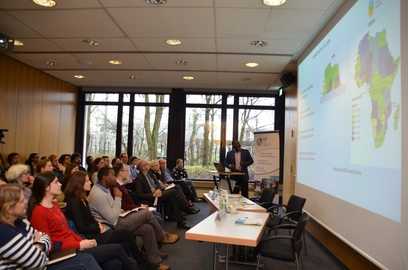Nourished: Learn lessons from success to beat malnutrition in Africa
March 23, 2018.
Bonn, March 22, 2018. "Despite progress made over the past 20 years, hunger in Africa persists" said Dr. Ousmane Badiane at an event at ZEF today during which the German version of '"<link https: www.mamopanel.org media uploads files rpt_2017_mamo_web_v01.pdf> Nourished": How Africa can build a future free from hunger and malnutrition' was launched.
The report was published in English by the<link https: www.mamopanel.org internal link in current> Malabo Montpellier Panel last year. The panel is co-chaired by <link http: www.ifpri.org profile ousmane-badiane internal link in current>Dr. Ousmane Badiane, Africa Director at the International Food and Policy Research Institute (IFPRI) in Washington D.C. and Prof. Joachim von Braun, ZEF-Director and co-chair of the Welthungerhilfe.
Several African countries, including Senegal, Ghana, and Ethiopia, have shown substantial success in reducing malnutrition over the last 15 years. Though there is a story behind each individual success story, these countries have certain features in common: There has to be a cohesive strategy in terms of setting the right priorities in national policies (nutrition as top priority), generating institutional synergies and implementing the right programs at each scale (including community level). Only if these three components work (together) progress can be achieved, the speakers stressed.
Hunger has become complex: Beside "classical" issues such as stunting, wasting and malnutrition remain, Africa also faces new, additional problems such as obesity as a consequence of a growing middle class with changing consumption patterns.
Further issues raised in the discussion and the subsequent Q&A round were:
How can agriculture play its crucial role and not only produce more [for a growing African population] but also more diverse food, how can Africa be more independent of (increasing) imports, how can knowledge about nutrition and healthy food be shared at all levels, starting from the household and family-level, to the community level and upwards, and how can the main threats to success (conflicts, e.g. over natural resources and climate change) be avoided or dealt with?
----------------------
You can download the full report of "Nourished" in English <link https: www.mamopanel.org media uploads files rpt_2017_mamo_web_v01.pdf internal link in current>here
and the German version "Ernährt" <link file:5492 download internal link in current>here. [If you want a printed copy please write an e-mail to presse.zef@uni-bonn.de]
You can watch the live-streamed launch event and discussion at ZEF on March 22, 2018 on our ZEF youtube channel <link https: www.youtube.com internal link in current>here.
You can look at Dr. Ousmane Badiane's power point presentation <link file:5465 internal link in current>here.
----------------------
The Malabo Montpellier Panel consists of 17 leading African and European experts in agriculture, ecology, nutrition, public policy and global development (see <link http: www.mamopanel.org>www.mamopanel.org).It is co-chaired by Dr. Ousmane Badiane and Professor Joachim von Braun. It supports high-level evidence-based dialogue and policy choices that accelerate progress towards the goals set out in the African Union’s Agenda 2063, the Malabo Declaration, and the Sustainable Development Goals. The Panel works with African governments and civil society organizations to provide access to data and analysis that facilitates the design and implementation of policies that enhance agriculture, food and nutrition security. For a full list of the Panel members please visit <link https: www.mamopanel.org about panel-members>www.mamopanel.org/about/panel-members/
Follow us on social media:
Twitter: <link https: twitter.com zefbonn external-link-new-window internal link in current>@zefbonn and <link https: twitter.com external-link-new-window internal link in current>@MamoPanel
Facebook: zefunibonn and MaMoPanel


